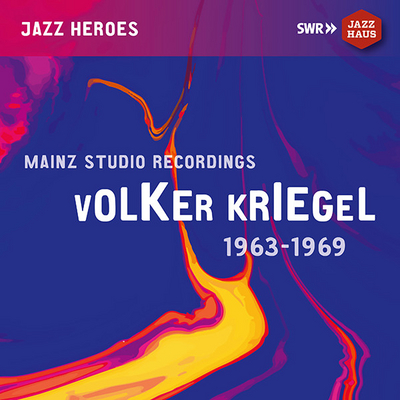Kriegel, Volker: Mainz Studio Recordings

1963–1969
2021
John Lewis
Margarita Lecuona
John Carisi
W.C. Handy
Thelonious Monk
Charles Trénet
Joseph Kosma
Jaques Prévert
Oliver Nelson
Volker Kriegel
Milt Jackson
John Lennon
Paul McCartney
Claudio Szenkar
Hans Rettenbacher
Gustl Mayer
Frank Zappa
Volker Kriegel
Helmut Kampe
Dieter Matschoss
Claudio Szenkar
Dieter von Goetze
Peter Baumeister
Reinhard Knieper
Ralf Hübner
Emil Mangelsdorff
Fritz Hartschuh
Gustl Mayer
Hans Rettenbacher
1-1 Django 6:18
1-2 Tabu 7:16
1-3 Israel 6:05
1-4 Saint Louis Blues 2:59
1-5 Rhythm-A-Ning 3:06
1-6 Les enfants s'ennuient le dimanche 3:53
1-7 Autumn Leaves 7:16
1-8 Three Seconds 4:17
1-9 Tea and Rum 2:36
1-10 Morandi 4:44
1-11 Don't Wait 2:55
1-12 Na Na Imboro 4:54
1-13 Nyleve 3:23
1-14 Connie's Blues 8:27
2-1 Vianda 4:41
2-2 Traffic Jam 4:04
2-3 Little Pear 4:47
2-4 Norwegian Wood 4:42
2-5 Five by Four 4:33
2-6 Royal Harp 3:44
2-7 Cry It Out 5:50
2-8 Soul Eggs 3:20
2-9 Noisy Silence, Gentle Noise 6:31
2-10 Somewhat, Somewhere, Somehow 5:02
2-11 Sitting On My Knees 3:23
2-12 Slums on Wheels 4:26
2-13 I'm On My Way 4:10
2-14 Pluns 2:56
2-15 Mother People 6:40
Born in Darmstadt, guitarist Volker Kriegel (1943–2003) was still a teenager when he made his debut in the late 50s, at a time when the guitar was still an outsider in the world of jazz. The instrument had few notable exponents, so it was still an open field when the self-taught musician from Hesse won first prizes for his solo performances at an amateur jazz festival in Düsseldorf. Südwestfunk (SWF) recorded the 19-year-old Kriegel’s debut recordings in 1963, when he performed as part of a trio at the Deutschhaus in Mainz; the studio sessions at the Kammersaal Studio were made in 1969. They stand worlds apart, since the guitar had started to carve out a niche for itself in the meantime, and Kriegel himself had gained in self-confidence. Above all, however, he had found a counterpart in Claudio Szenkar, who opened up perspectives not only in general terms of communication and composition, but also specifically through Kriegel’s own instrument. The combination of vibraphone and guitar was then still fairly new. In 1968, Kriegel decided to make music his main profession. Thanks to With A Little Help from My Friends and an appearance at the German Jazz Festival in Frankfurt, he achieved his breakthrough into public recognition. Together with vibraphonist Dave Pike, bassist Hans Rettenbacher and drummer Peter Baumeister, he founded the Dave Pike Set, which became his artistic centre for four years and a beacon combo of European jazz rock.
This release is also available as extended digital version.